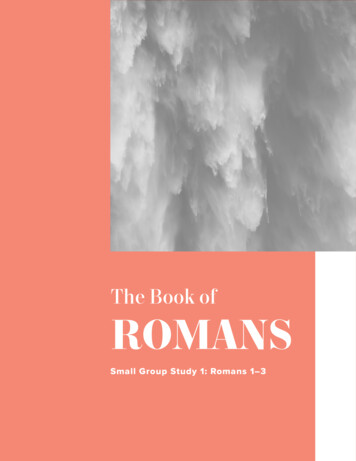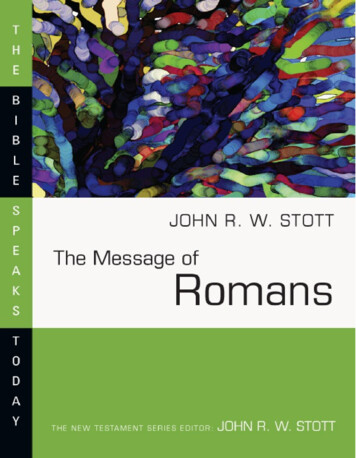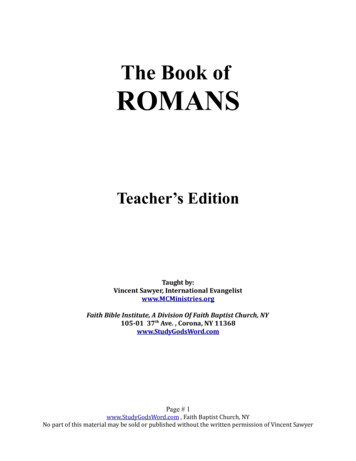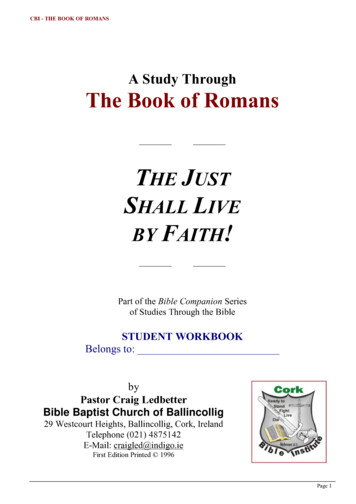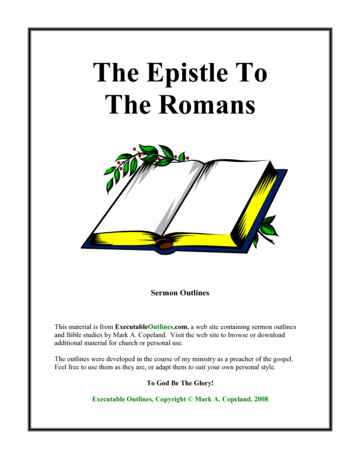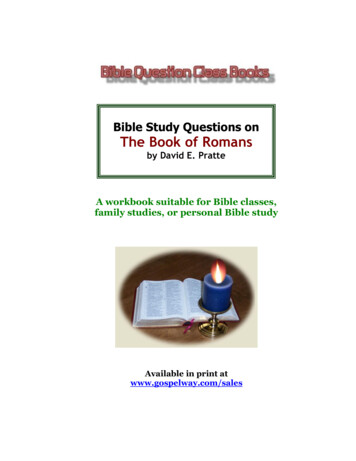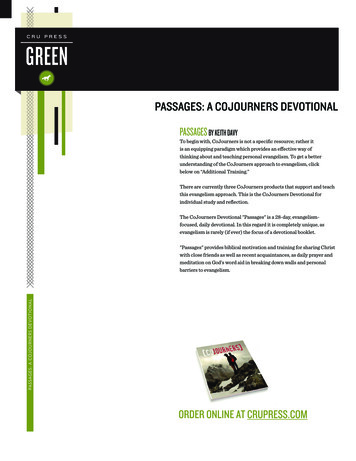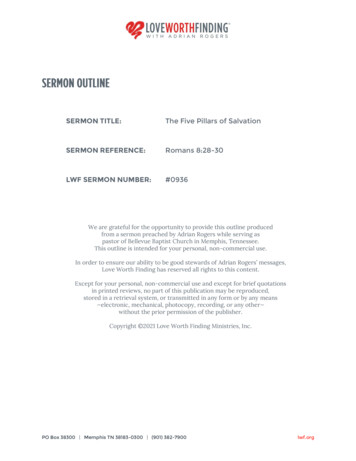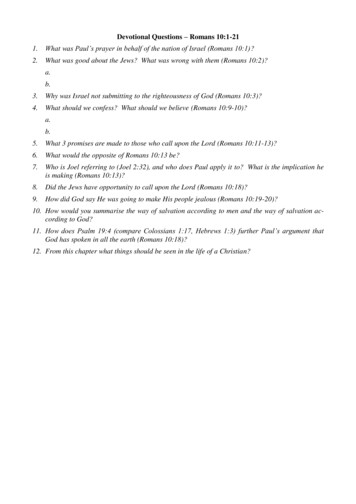
Transcription
Devotional Questions – Romans 10:1-211.What was Paul’s prayer in behalf of the nation of Israel (Romans 10:1)?2.What was good about the Jews? What was wrong with them (Romans 10:2)?a.b.3.Why was Israel not submitting to the righteousness of God (Romans 10:3)?4.What should we confess? What should we believe (Romans 10:9-10)?a.b.5.What 3 promises are made to those who call upon the Lord (Romans 10:11-13)?6.What would the opposite of Romans 10:13 be?7.Who is Joel referring to (Joel 2:32), and who does Paul apply it to? What is the implication heis making (Romans 10:13)?8.Did the Jews have opportunity to call upon the Lord (Romans 10:18)?9.How did God say He was going to make His people jealous (Romans 10:19-20)?10. How would you summarise the way of salvation according to men and the way of salvation according to God?11. How does Psalm 19:4 (compare Colossians 1:17, Hebrews 1:3) further Paul’s argument thatGod has spoken in all the earth (Romans 10:18)?12. From this chapter what things should be seen in the life of a Christian?
2Devotional Questions – Romans 10:1-21, Answers to QuestionsSee Dr Ruckman’s commentary The Book of Romans pp 383-419 and the Ruckman Reference Biblepp 1174, 1500-1501, 1609 for detailed comment.1.What was Paul’s prayer in behalf of the nation of Israel (Romans 10:1)?Paul’s prayer is for the salvation of Israel. Paul’s prayer will be answered at the Second Advent.See www.timefortruth.co.uk/alan-oreilly/ Romans 9 Part 1, Question 1 and these scriptures thatconfirm God’s answer.“And the Redeemer shall come to Zion, and unto them that turn from transgression in Jacob,saith the LORD” Isaiah 59:20.“Who hath heard such a thing? who hath seen such things? Shall the earth be made to bringforth in one day? or shall a nation be born at once? for as soon as Zion travailed, she broughtforth her children” Isaiah 66:8.“For behold the stone that I have laid before Joshua; upon one stone shall be seven eyes: behold, I will engrave the graving thereof, saith the LORD of hosts, and I will remove the iniquity of that land in one day” Zechariah 3:9.“And I will pour upon the house of David, and upon the inhabitants of Jerusalem, the spiritof grace and of supplications: and they shall look upon me whom they have pierced, and theyshall mourn for him, as one mourneth for his only son, and shall be in bitterness for him, asone that is in bitterness for his firstborn” Zechariah 12:10.Paul is in effect asking God to do what He has said He would do. This is germane to effectiveprayer, now as then as Isaiah, Jeremiah and Ezekiel show.“For the LORD of hosts hath purposed, and who shall disannul it? and his hand is stretchedout, and who shall turn it back?” Isaiah 14:27.“So shall my word be that goeth forth out of my mouth: it shall not return unto me void, but itshall accomplish that which I please, and it shall prosper in the thing whereto I sent it” Isaiah55:11.“Then said the LORD unto me, Thou hast well seen: for I will hasten my word to perform it”Jeremiah 1:12.“For I am the LORD: I will speak, and the word that I shall speak shall come to pass; it shallbe no more prolonged: for in your days, O rebellious house, will I say the word, and will perform it, saith the Lord GOD” Ezekiel 12:25.
32.What was good about the Jews? What was wrong with them (Romans 10:2)?a. They were eager to serve and to please God.b. Like Paul they “did it ignorantly in unbelief” 1 Timothy 1:13.Today’s believer must remember that God is served and pleased on His terms, no-one else’s.“For we are his workmanship, created in Christ Jesus unto good works, which God hath before ordained that we should walk in them” Ephesians 2:10.“Nevertheless the foundation of God standeth sure, having this seal, The Lord knoweth themthat are his. And, Let every one that nameth the name of Christ depart from iniquity.If aman therefore purge himself from these, he shall be a vessel unto honour, sanctified, andmeet for the master’s use, and prepared unto every good work” 2 Timothy 2:19, 21.“For the grace of God that bringeth salvation hath appeared to all men, Teaching us that, denying ungodliness and worldly lusts, we should live soberly, righteously, and godly, in thispresent world; Looking for that blessed hope, and the glorious appearing of the great God andour Saviour Jesus Christ; Who gave himself for us, that he might redeem us from all iniquity,and purify unto himself a peculiar people, zealous of good works” Titus 2:11-14.3.Why was Israel not submitting to the righteousness of God (Romans 10:3)?Israel thought that she was more righteous than God. Every unsaved sinner headed for hellthinks the same and his answer to Elihu’s question is yes.“Elihu spake moreover, and said, Thinkest thou this to be right, that thou saidst, My righteousness is more than God’s?” Job 35:2. Unsaved sinners do think that and the end result isdire, as the onlookers will see for themselves.“And they shall go forth, and look upon the carcases of the men that have transgressedagainst me: for their worm shall not die, neither shall their fire be quenched; and they shallbe an abhorring unto all flesh” Isaiah 66:8.4.What should we confess? What should we believe (Romans 10:9-10)?a. “with thy mouth the Lord Jesus.unto salvation”b. “in thine heart that God hath raised him from the dead.unto righteousness”Righteousness i.e. salvation in the church age results only from heart belief that God raised theLord Jesus Christ from the dead because He alone is righteousness of Whom Peter and Paul said“Whom God hath raised up, having loosed the pains of death: because it was not possible thathe should be holden of it” Acts 2:24 “And declared to be the Son of God with power, according to the spirit of holiness, by the resurrection from the dead” Romans 1:4.“Confession.unto salvation” is thereby embodied in the individual’s declaration from the heartthat the Lord Jesus Christ is the Son of God thereby risen from death that could not legitimatelyhold Him because He is “Jesus Christ the righteous.the propitiation for our sins: and not forours only, but also for the sins of the whole world” 1 John 2:1-2. See inserted study Propitiation.In turn “righteousness delivereth from death” Proverbs 10:2, 11:4 only the individual who willingly receives “.the gift of God: Not of works, lest any man should boast” Ephesians 2:8-9namely “the righteousness of God and our Saviour Jesus Christ” 2 Peter 1:1 “Who deliveredus from so great a death, and doth deliver: in whom we trust that he will yet deliver us” 2 Corinthians 1:10.
4The Ethiopian’s “confession.unto salvation” embodies all of the above, so the apostates cut itout. See son.php AV1611 vs NIV & Salvation vs Damnation (Abridged Version) pp 11-13.“And Philip said, If thou believest with all thine heart, thou mayest. And he answered andsaid, I believe that Jesus Christ is the Son of God” Acts 8:37.5.What 3 promises are made to those who call upon the Lord (Romans 10:11-13)?These are un-ashamedness, enrichment and “an everlasting salvation” that God has promised toIsrael – see Question 1 - but likewise apply to today’s believer “For all the promises of God inhim are yea, and in him Amen, unto the glory of God by us” 2 Corinthians 1:20.“The blessing of the LORD, it maketh rich, and he addeth no sorrow with it” Proverbs 10:22.“But Israel shall be saved in the LORD with an everlasting salvation: ye shall not be ashamednor confounded world without end” Isaiah 45:17.Today’s believer should therefore follow Paul’s admonition and example because the Lord JesusChrist is unashamed towards His brethren for that reason.“Be not thou therefore ashamed of the testimony of our Lord, nor of me his prisoner: but bethou partaker of the afflictions of the gospel according to the power of God” 2 Timothy 1:8.“For the which cause I also suffer these things: nevertheless I am not ashamed: for I knowwhom I have believed, and am persuaded that he is able to keep that which I have committedunto him against that day” 2 Timothy 1:12.“For both he that sanctifieth and they who are sanctified are all of one: for which cause he isnot ashamed to call them brethren” Hebrews 2:11.6.What would the opposite of Romans 10:13 be?See Question 3 and Isaiah 66:8 “And they shall go forth, and look upon the carcases of themen that have transgressed against me: for their worm shall not die, neither shall their fire bequenched; and they shall be an abhorring unto all flesh.”7.Who is Joel referring to (Joel 2:32), and who does Paul apply it to? What is the implication heis making (Romans 10:13)?Joel is referring prophetically to a believing remnant looking for the Lord Jesus Christ at theSecond Advent when “unto them that look for him shall he appear the second time without sinunto salvation” Hebrews 9:28. Paul is making spiritual application now for any individualseeking salvation as the Ethiopian did, Question 4, for which there is no implication but ratherdeclaration as Peter states - for anyone seeking salvation now - of the Lord Jesus Christ “Towhom coming, as unto a living stone, disallowed indeed of men, but chosen of God, and precious.Who his own self bare our sins in his own body on the tree, that we, being dead to sins,should live unto righteousness: by whose stripes ye were healed” 1 Peter 2:4, 24.8.Did the Jews have opportunity to call upon the Lord (Romans 10:18)?They did repeatedly as Romans 10:21 states “But to Israel he saith, All day long I havestretched forth my hands unto a disobedient and gainsaying people” and as the apostles testified. “Then Paul and Barnabas waxed bold, and said, It was necessary that the word of Godshould first have been spoken to you: but seeing ye put it from you, and judge yourselves unworthy of everlasting life, lo, we turn to the Gentiles” Acts 13:46.Note therefore Paul’s admonition with respect to dishonest sceptics e.g. King James Bible critics.“A man that is an heretick after the first and second admonition reject; Knowing that he thatis such is subverted, and sinneth, being condemned of himself” Titus 3:10-11.
59.How did God say He was going to make His people jealous (Romans 10:19-20)?This would be by: “them that are no people” Romans 10:19 instead of “the people of God” Hebrews 11:25 “a foolish nation” Romans 10:19 instead of “an holy nation” Exodus 19:6 “them that sought me not.that asked not after me” Romans 10:20 instead of “Israel.hispeculiar treasure” Psalm 135:4.Peter has shown how today’s believer has benefitted from that which Israel forfeited.“But ye are a chosen generation, a royal priesthood, an holy nation, a peculiar people; that yeshould shew forth the praises of him who hath called you out of darkness into his marvellouslight: Which in time past were not a people, but are now the people of God: which had not obtained mercy, but now have obtained mercy” 1 Peter 2:9-10.10. How would you summarise the way of salvation according to men and the way of salvation according to God?Do versus done.“Not by works of righteousness which we have done, but according to his mercy he saved us,by the washing of regeneration, and renewing of the Holy Ghost; Which he shed on us abundantly through Jesus Christ our Saviour; That being justified by his grace, we should be madeheirs according to the hope of eternal life” Titus 3:5-7.11. How does Psalm 19:4 (compare Colossians 1:17, Hebrews 1:3) further Paul’s argument thatGod has spoken in all the earth (Romans 10:18)?As the apostles said “Lord, thou art God, which hast made heaven, and earth, and the sea, andall that in them is” Acts 4:24 with Colossians 1:17, Hebrews 1:3, and therefore “The heavensdeclare the glory of God; and the firmament sheweth his handywork.Their line is gone outthrough all the earth, and their words to the end of the world” Psalm 19:1, 4.By inspection, Romans 10:18 is almost an exact citation of Psalm 19:4 and is further testimonyto what Paul has said earlier about creation’s witness to men of its Creator and further condemnation of man’s rebelliousness against his Creator.“For the invisible things of him from the creation of the world are clearly seen, being understood by the things that are made, even his eternal power and Godhead; so that they are without excuse: Because that, when they knew God, they glorified him not as God, neither werethankful; but became vain in their imaginations, and their foolish heart was darkened” Romans 1:20-21.Today’s believer should of course keep in mind the fragility of his own created self, which inturn should shape his perceptions day to day, as James states.“Whereas ye know not what shall be on the morrow. For what is your life? It is even a vapour, that appeareth for a little time, and then vanisheth away. For that ye ought to say, Ifthe Lord will, we shall live, and do this, or that” James 4:14-15.
612. From this chapter what things should be seen in the life of a Christian? “the prayer of faith” James 5:15 as Paul prayed for his countrymen. “Brethren, my heart’sdesire and prayer to God for Israel is, that they might be saved” Romans 10:1. “the word of faith, which we preach” Romans 10:8 as Paul exhorted Timothy. “Hold fastthe form of sound words, which thou hast heard of me, in faith and love which is in ChristJesus” 2 Timothy 1:13. “the work of faith” though it be “the foolishness of preaching” 1 Corinthians 1:21 for “howshall they hear without a preacher?” Romans 10:14. “Wherefore also we pray always foryou, that our God would count you worthy of this calling, and fulfil all the good pleasureof his goodness, and the work of faith with power: That the name of our Lord Jesus Christmay be glorified in you, and ye in him, according to the grace of our God and the Lord Jesus Christ” 2 Thessalonians 1:11-12.
7PropitiationBased on Reply to DiVietro’s Attack on Gail Riplinger – Flotsam Flush pp ite-dr-divietro-and-dawaite.php“Propitiation” from the ScripturesConcerning the word propitiate, or therelated Biblical term “propitiation”Romans 3:25, 1 John 2:2, 4:10, again‘the Greek’ isn’t necessary to determinethe meaning of the word.Following Dr Mrs Riplinger’s approach1,the word “propitiation” is understoodfrom scripture as follows.Romans 3:24-25 “Christ Jesus: WhomGod hath set forth to be a propitiation through faith in his blood, to declare his righteousness for the remission of sins that are past, throughthe forbearance of God;”1 John 2:1-2 “Jesus Christ the righteous: And he is the propitiation forour sins: and not for ours only, butalso for the sins of the whole world.”1 John 4:10 “Herein is love, not thatwe loved God, but that he loved us,and sent his Son to be the propitiation for our sins.”“But he was wounded for our transgressions, he was bruised for our iniquities: the chastisement of ourpeace was upon him; and with hisstripes we are healed” Isaiah 53:5jesuswords.tumblr.com/Propitiation is a Person“Propitiation,” like salvation, Luke 2:30, 19:9, is above all a Person2, “Jesus Christthe righteous.” God is a personal God, not simply a theological or doctrinal God.Dr DiVietro gives no indication of any lexicon that reveals this basic meaning of theword “propitiation.”The scripture, however, gives further insight into this meaning.1 John 4:14 states “And we have seen and do testify that the Father sent theSon to be the Saviour of the world.”In sum, “The Saviour” and “the propitiation” are one and the same. He is “JesusChrist the righteous” or “Jehovah is salvation”3 Matthew 1:21, Who is “the Messiah the Prince” Daniel 9:25 and “the Holy One” 1 John 2:20, anointed of the HolyGhost Luke 3:22, 4:18.The word “propitiation” may be understood in more detail by a study of what theLord Jesus Christ did as “the Saviour of the world.”As such, He is “the Lamb of God, which taketh away the sin of the world” John1:29.
8Propitiation is “Christ our Passover”Therefore, as Paul states in 1 Corinthians 5:7 “For even Christ our passover issacrificed for us.”Ephesians 5:2, Hebrews 7:26-27, 9:26, 1 Peter 1:18-19 are all important in the context of “Christ our Passover,” along with Genesis 8:21.“And walk in love, as Christ also hath loved us, and hath given himself for usan offering and a sacrifice to God for a sweetsmelling savour.”“For such an high priest became us, who is holy, harmless, undefiled, separate from sinners, and made higher than the heavens; Who needeth not daily,as those high priests, to offer up sacrifice, first for his own sins, and then forthe people’s: for this he did once, when he offered up himself.”“For then must he often have suffered since the foundation of the world: butnow once in the end of the world hath he appeared to put away sin by the sacrifice of himself.”“Forasmuch as ye know that ye were not redeemed with corruptible things, assilver and gold, from your vain conversation received by tradition from yourfathers; But with the precious blood of Christ, as of a lamb without blemishand without spot” 1 Peter 1:18-19.“And the LORD smelled a sweet savour;and the LORD said in his heart, I will notagain curse the ground any more forman’s sake; for the imagination of man'sheart is evil from his youth; neither will Iagain smite any more every thing living, asI have done.”Propitiation is “the Saviour” and “savour”The voluntary, sinless sacrifice “which takethaway the sin of the world” of the Lord JesusChrist Himself “to God” as “a sweetsmelling savour” turned away God’s wrath asNoah’s sacrifice did after the flood, for anyonewho believes that the Lord Jesus Christ isboth “the Saviour” and “savour” for himpersonally, John 3:36.Propitiation – Christ’s Appeasement ofGod’s Justifiable Wrathwww.lbible.org/index.php?proc msg&sf vw&tid 429This is “propitiation.”Drs Waite and DiVietro may dismiss the above as an example of having to “chase allover the King James Bible to find the definitions of its words” 4 but “he that seekethfindeth” Matthew 7:7 and “unto you that hear shall more be given” Mark 4:24.References1In Awe of Thy Word by G. A. Riplinger www.avpublications.com/avnew/home.html pp 81-822Ruckman Reference Bible, p 16383The Oxford Bible Reader’s Dictionary & Concordance4Dr D. A. Waite and The Dead Bible Society ivietro-and-dawaite.php p 6
2 Devotional Questions – Romans 10:1-21, Answers to Questions See Dr Ruckman’s commentary The Book of Romans pp 383-419 and the Ruckman Reference Bible pp 1174, 1500-1501, 1609 for detailed comment. 1. What was Paul’s prayer in behalf of the nation of Israel (Romans 10

